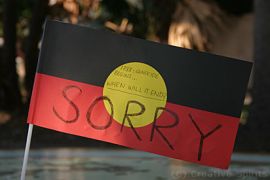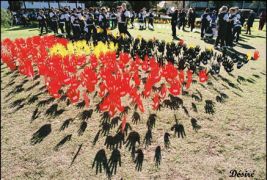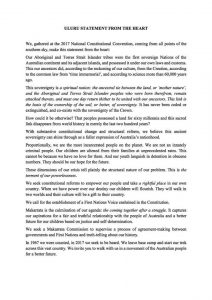Sorry Day and the Long Walk to recognition
May 22nd, 2013 | Published in Race(ism)

(NOTE: The views in this post now need to be read in relation to a more recent statement by more than 250 Indigenous elders in May 2017, in which they reject tokenistic changes to the constitution and call for a constitutionally enshrined Indigenous voice in parliament and a commission that will lead to a treaty.)
………………………………………………….
May 26 is Sorry Day in Australia’s calendar, and New Year’s Day in my Social Justice Calendar. It feels right for the first day of such a calendar to pay respect to First Australians, acknowledge injustice against them, and support recognition in the constitution.
The inaugural Sorry Day of 1998 was a landmark event – historically, and in my own journey. It marked the anniversary of the tabling of Bringing them Home by the Human Rights and Equal Opportunity Commission. Hundreds of thousands of Australians participated in events, and my own workplace hosted a moving ritual involving staff, clients, management, and board. I was intensely aware of the Stolen Generations, the Royal Commission into Aboriginal Deaths in Custody, and the issues for women, of all colours, that had absorbed my attention over many years.
Not enough years, I realise, given that the policy of removing Indigenous children from their families was in place while I was growing up. Race was invisible in White Australia, particularly perhaps in my eastern corner of Melbourne, and history lessons started at colonisation. I know I was not alone in my childhood ignorance, but I also know I am in good company in wanting change. Sorry Day is one of those times when we stand up to say so. 
I will always be grateful for Sorry Day, 1998, because the next year was very different. Compulsory Competitive Tendering had swept through community services and Sorry Day did not fit the market mindset that followed in its wake, at least in the agency I was working in. The fifteen-minute ritual did not count as work according to our newly appointed executive director, and “it would not happen again.”
Thus began another hard lesson – about power and its abuses in the workplace, even those espousing social justice in their mission statements it seems. All issues of social justice are intersecting, I was coming to realise, and to care about any – racism, sexism, heterosexism, classism, ageism, ableism, worker abuse, homelessness, global injustice or poverty – comes with a mandate to care about all, woven together as they are by the web of power relations. Understanding the operation of this web is central to promoting social justice.
Sorry Days following 1998 were not marked by ritual for me, although swimming at Windy Hill pool every day kept me aware of Indigenous Australians. Essendon footballers swim there, and Michael Long used to be one of them. I remember pulling myself to the end of the pool by the rope one day because my foot had cramped. He was in the next lane, dangling as one does in the warm deep water to soothe an aching body. He was nonetheless sufficiently tuned-in to ask if I was okay.
 I’m not sure when that incident was in relation to the first Long Walk of 2004, when Michael Long trekked the 650 kilometres from Melbourne to Canberra to bring Indigenous issues to national attention. The following year I was among the 10,000 who joined him in a community walk around Princes Park, wearing the Long Walk t-shirt: I still have it, still wear it, and still hang it in the Windy Hill changeroom.
I’m not sure when that incident was in relation to the first Long Walk of 2004, when Michael Long trekked the 650 kilometres from Melbourne to Canberra to bring Indigenous issues to national attention. The following year I was among the 10,000 who joined him in a community walk around Princes Park, wearing the Long Walk t-shirt: I still have it, still wear it, and still hang it in the Windy Hill changeroom.
This year the Long Walk and Sorry Day coincide on Sunday May 26, and both are linked to the campaign for recognition of Aboriginal and Torres Strait Islander Peoples in the Australian constitution. I will be at Federation Square at 9.30 AM – or perhaps earlier in the hope of updating my t-shirt.
Sorry Day has become the New Year’s Day of my Social Justice Calendar, not because I am an Indigenous Australian, or even because I am not. As the legend on my 2005 t-shirt reminds me: “This isn’t about Indigenous Australia and White Australia – this is about all Australia” – Michael Long.
By Sorry Day next year the Long Walk towards recognition will hopefully be across the finishing line.
(NOTE: Since publishing this post I have learned that views among First Nations people vary about recognition in the constitution, so I am now less clear about my support. I would like to know how the majority sit once we know the wording of the proposed changes and the wording of the referendum question, and I would vote accordingly.)
Suggestions for the other 355 days of the Social Justice Calendar are most welcome through this website (click here, or below as a comment on this post), or go to the facebook page (click here), or by email at 2020socialjustice@gmail.com. Best Themis blessings…Joan Beckwith.
…………………………………………………
(Postscript: Here is the “Statement from the Heart” written by more than 250 Indigenous leaders at Uluru in May, 2017, in which they call for a treaty and a constitutionally enshrined Indigenous voice in parliament.)




Perhaps we need one mega-movement for social equity? There have certainly been times over the journey when it has all seemed a bit overwhelming to me, but I also think that at those times there is a kind of solidarity-of-the-spirit that can be valuable. Today felt like a positive hopeful event, a feeling perhaps contributed to even by those whose boots are under their desks, or walking-the-talk elsewhere…Joan Beckwtih.
Joan’s article is a timely reminder to me, and I would think others, how important events such as the National Sorry day was and still is. I am feeling guilty right now as I am weighed down doing other stuff and have not paid much attention to this historic date.
I must confess I sometimes feel overwhelmed by the ‘strong callings” to pay attention and put on my walking boots to show solidarity and respect.